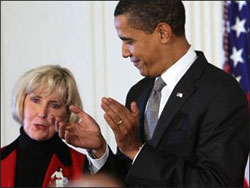This is an archive of news stories and research from the National Union of Public and General Employees. Please see our new site - https://nupge.ca - for the most current information.
With the Harper Conservatives moving in the opposite direction, the contrast between Canada and the new administration in Washington is startling.
 Ottawa (30 Jan. 2009) - While the Harper Conservatives are working to undermine pay equity in Canada, President Barack Obama signed the Lilly Ledbetter Fair Pay Act Thursday in Washington, calling it an important economic issue that affects not only women but entire families.
Ottawa (30 Jan. 2009) - While the Harper Conservatives are working to undermine pay equity in Canada, President Barack Obama signed the Lilly Ledbetter Fair Pay Act Thursday in Washington, calling it an important economic issue that affects not only women but entire families.
In a White House signing ceremony packed with symbolism — and in the presence of the woman who inspired the bill — Obama chose the statute as the first piece of legislation to sign into law in his presidency.
Also attending were Nancy Pelosi, the first woman speaker of the House of Representatives, Hillary Clinton, now Secretary of State, as well as dozens of representatives from women's and labour groups.
To the applause and cheers of all present, the new president said:
"I intend to send a clear message: That making our economy work means making sure it works for everyone. That there are no second class citizens in our workplaces, and that it's not just unfair and illegal – it's bad for business - to pay someone less because of their gender, or their age, race, ethnicity, religion or disability."
By his side was Lilly Ledbetter, who did not become aware that she was being discriminated against until she neared the end of a 19-year career at a Goodyear Tire & Rubber Co. plant in Gadsden, Ala. She sued, carrying her case all the way to the U.S. Supreme Court, only to lose last year when it declared she had missed her chance for justice.
Until now, U.S. workers have been forced to file pay equity lawsuits within 180 days of any decision by an employer to pay them less than another worker for the same job. The new bill, passed by Congress this week, would create a new window of 180 days to launch legal action every time an employer issues a discriminatory pay to an employee.
Meanwhile in Canada, the Harper Conservatives are moving in the opposite direction on pay equity.
The new budget tabled this week by Finance Minister Jim Flaherty promises (in the usual Orwellian language of neo-conservatives) to "modernize" federal pay equity by narrowing legal options open to women.
The proposal, first put forward in the government's December financial statement, was revived again this week. Flaherty said nothing publicly when he read his budget speech in the House of Commons but the plan remains in the fine print of official budget documents.
Unlike the minister's December economic statement, which said women would no longer be able to file pay equity complaints with the Canadian Human Rights Commission, the budget did not say exactly how the government would proceed this time. But it left open the option of cutting the courts out of the equation. Here is what the document says:
"The existing complaint-based pay equity regime is a lengthy, costly and adversarial process that does not serve employees or employers well. Legislation to modernize the pay equity regime for federal public sector employees will be introduced. The new regime reflects the Government’s commitment to pay equity. It will ensure that the employer and bargaining agents are jointly responsible and accountable for negotiating salaries that are fair and equitable to all employees."
Canada's Economic Action Plan
Structural Changes
Page 211 Link to PDF
NUPGE
The National Union of Public and General Employees (NUPGE) is one of Canada's largest labour organizations with over 340,000 members. Our mission is to improve the lives of working families and to build a stronger Canada by ensuring our common wealth is used for the common good. NUPGE
More information:
